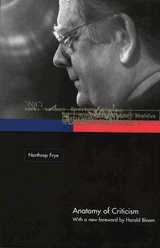
I think part of my apparent resistance to efforts to apply logical, scientific, or mathematical models to account for literary phenomena is due to the long-standing and ongoing tacit contempt within the university and elsewhere for the value of literature and literary studies. This attitude is sadly the case even within English departments or literature departments. Certainly at my university there is no avoiding the sense that one belongs to the “special needs” group, and that we must be both pitied and patronized by those who are in the real business of scholarship and research, since what they do actually means something in the “real world”: curing cancer, building bridges, producing wealth. How far this attitude is from Frye’s conception of the university he has eloquently articulated in writings too numerous to mention here.
The problem, however, is that this attitude has been internalized by literary scholars themselves, and swallowed whole by cultural studies scholars who have decided that since literature is a confidence game, a shill for the social establishment, the purpose of critical analysis must be to demythologize literature. In contrast, Frye believed in the authority of literature. It was criticism and literary scholarship that were incoherent. The central purpose of the Anatomy was to clarify and establish the parts and principles of criticism, to derive and synthesize a working structural poetics from an inductive survey of literature itself, and to begin building an autonomous body of knowledge on these discoveries. Literary criticism would then no longer feel it needed to seek outside itself for verification of its validity, like a toddler anxiously turning to its mother for permission to walk. There is always something about explanations of literature from other disciplines that smacks of this attitude of dependency that Frye did his best to discredit, and of course these explanations are largely the work of literary scholars themselves. How can we possibly know what to say about literature and myth and metaphor unless we apply real knowledge–from history, anthropology, psychology, cognitive science, now neuroscience even, etc.– to explain them? It couldn’t possibly come from literature itself.
I was on a thesis defense in English a couple of years ago and one of the external examiners was a professor of psychology, a specialist in cognitive science. He used his period of questioning as a teaching moment, as he patiently explained to us what a great tool cognitive science would be to literary scholars in understanding something like metaphor. I am sure that cognitive science can teach us a good deal. On the other hand, it was pretty clear that it had never occurred to him that, when it came to metaphor, reading someone like Northrop Frye might be a greater benefit to him than his particular discipline would be to us.
The fact that my own department here at McMaster is a cultural studies stronghold may account for my particular sensitivity on this point. On my desk right now is a thesis I have been asked to read entitled “Redefining the Victorian Ideal: the Productive Transnormative Family in Sensation Fiction,” which focuses on two popular sensational novels of the Victorian era, one of which, Lady Audley’s Secret, was mentioned by Russell Perkin in an earlier post. The title of the thesis makes my point.
It seems so easy to subordinate literature to something else, something other than story and imagery, something other than the literary universe itself, that a certain amount of knee-jerk resistance may not be out of order.

Have you checked these guys out?
http://www.neuroesthetics.org/
I understand what you are saying. I think the difference is that relating literature to economics or politics or power relations between the sexes, is setting up a determinism with the implication that literature has no empirical structure that is proper to itself, in other words, it empties literature of literary content.
But bringing logic or even math to the table is a different matter, because these are tools that can be used to build a properly literary structure, they are not the structure itself, they do not usurp the content of literature. Frye liked to make analogies between the study of literature and other disciplines, and if you consider other disciplines, you see that the use of mathematics or logic does not work to subordinate them to something outside themselves.
Frye liked to use diagrams. That did not subordinate literature to geometry or graph theory.
I’m not insisting that everyone think as I do, but I do believe that if people with a logical temperament could find a place in literary studies, they could do a lot to build an objective(ish) “science” of literary convention which would establish the properly literary structure of literature
It does seem a shame that no one seems to ask why anyone would want to cast a work in literary form any more–something that The Educated Imagination itself addressed so well I always thought. I also think Frye–and many of his contemporaries–were much better at seeing and talking about the various constructions human beings deploy and the motives for deploying them. Contemporary critics seem to have gone back to the dark ages on questions like this, so that you often wonder whether they would even recognize an allegory if one bit them! It would also seem relevant to say that although Frye thought that he inhabited the same imaginative universe as Blake, Coleridge etc, most contemporary theorists are convinced that anything before 1968 let’s say is completely out of their field of vision, so you get bizarre frames of reference brought to bear in the name of redefining the Victorian idea or whatever. Sho’ is a mysterious discipline these days. Good to be in touch!